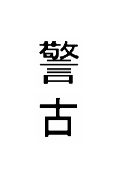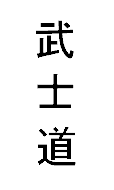 |
|||||||
|
©™
2003 - 2004: OWH International - Ueshiba Aikido : Victoria, Canada All Rights Reserved |
|||||||
|
|||||||
Gordon Head Recreation Centre Aikido classes have now begun at the Gordon Head Recreation Centre. I would like to thank the program managers, Ms Vicki Grabham and Mr Jason Jones for making the classes possible. The classes are: Adults
- Thursdays 5:15 - 6:15pm These classes are on-going. If you have friends or family who may be interested in practising the fine art of Aikido, they are most welcome to sign up at the recreation centre. Keiko - Practice
Looking at the characters that make up the word "keiko", or practice, the two characters literally translate to mean "admonish, or warning" and "old, or ancient". Is it a warning to strip of old habits/behaviour? An admonishment of what is no longer beneficial to oneself? When O Sensei talked about practising, the reference was constantly to the refinement of oneself - of tempering the spirit. As O Sensei stated: "The purpose of training is to tighten up the slack, toughen the body, and polish the spirit." The commitment to study and practice Aikido is to constantly be mindful of one's attitude, behaviour, purpose and to constantly improve oneself in everyway. It is the difference between saying "I would like to be practising more" and "I am practising" The martial artist is in constant practice, everyday; especially outside the dojo. Why? This is where integrity will be most important because you are alone with yourself. Once you step on the path of Aikido, every moment is filled with the idea that "I am practising". Constant practice entails having a routine everyday, and striving to do the best at even the smallest thing. To practice at every moment is to live with razor sharp awareness and focus. Being in the present moment means being alert to your surroundings, the people around you, and everything that happens. It is also having the proper behaviour at the appropriate time. Practising to live in such a conscious and responsible manner contributes to the practice of aikido technique in the dojo. And practising aikido outside the dojo means being in harmony with everything around you; treating the world as a dojo. Ask yourself, how would you behave if no one was looking? And how would you behave when someone is? If a parent tells a child not to rest their feet on the coffee table, do they do the same when the child is not around?
There is a story of a master who woke up earlier than usual one morning and started to prepare the morning tea. It is normally the duty of his disciple to prepare tea every morning for the entire monastry. When the disciple finally awoke to find the tea already prepared, he humbly asked the master why he did not wait or wake him up? The master answered simply, "because I was in the kitchen." ... A wise and responsible person would do what needs to be done without needing to be asked nor would they "pass the buck". For a child, it means finishing work that needs to be completed or clearing one's room before going out to play. It means reading up on a topic before going to class the next day, and always being prepared without being told to do so. It is joyfully meeting deadlines without complain nor excuses. So what makes a person a success? What makes an 'A' student or a concert pianist? How does a child grow up to be a good-natured, well-mannered and responsible adult? What makes a good Aikidoist? Proper guidance, dedication, and living a life of practice. (Copyright Sept. 2004: Rafael Oei) |
|||||||
| ©™
2003 - 2004: OWH International - Ueshiba Aikido : All Rights Reserved |

